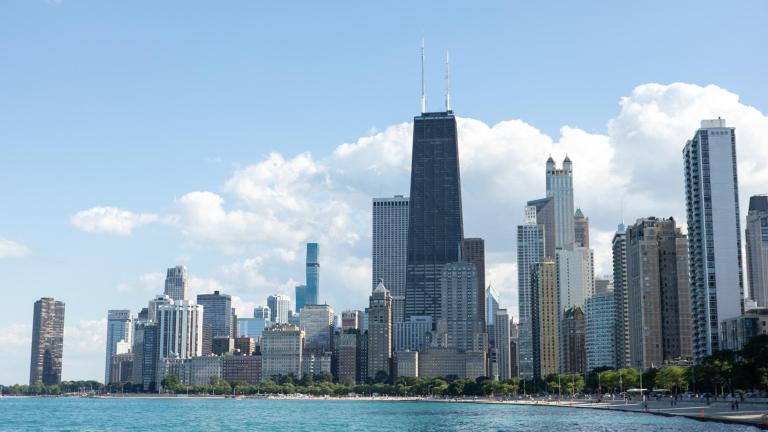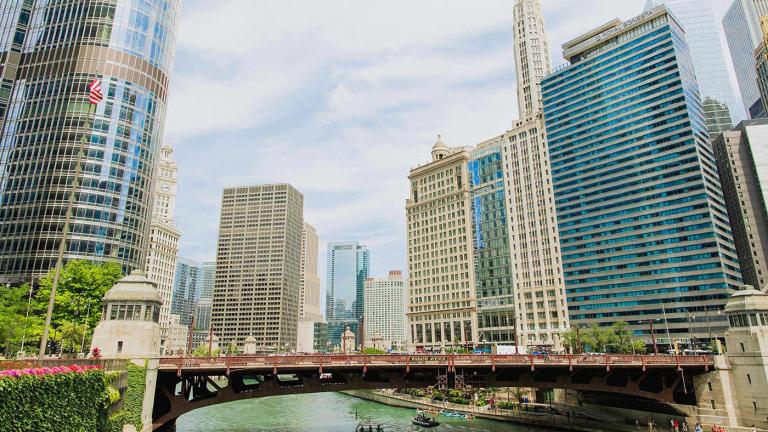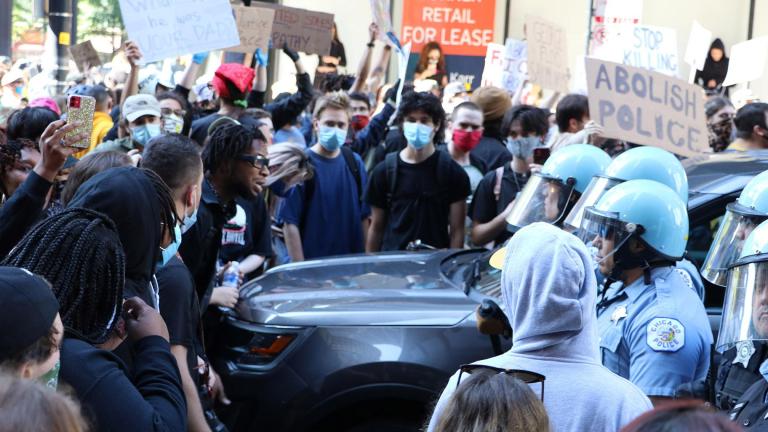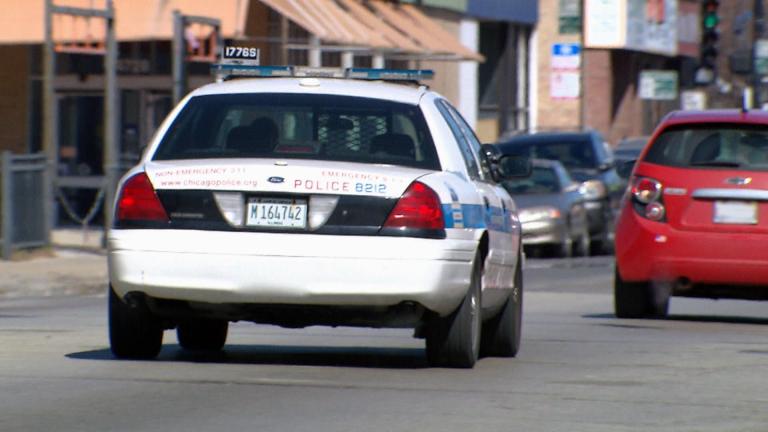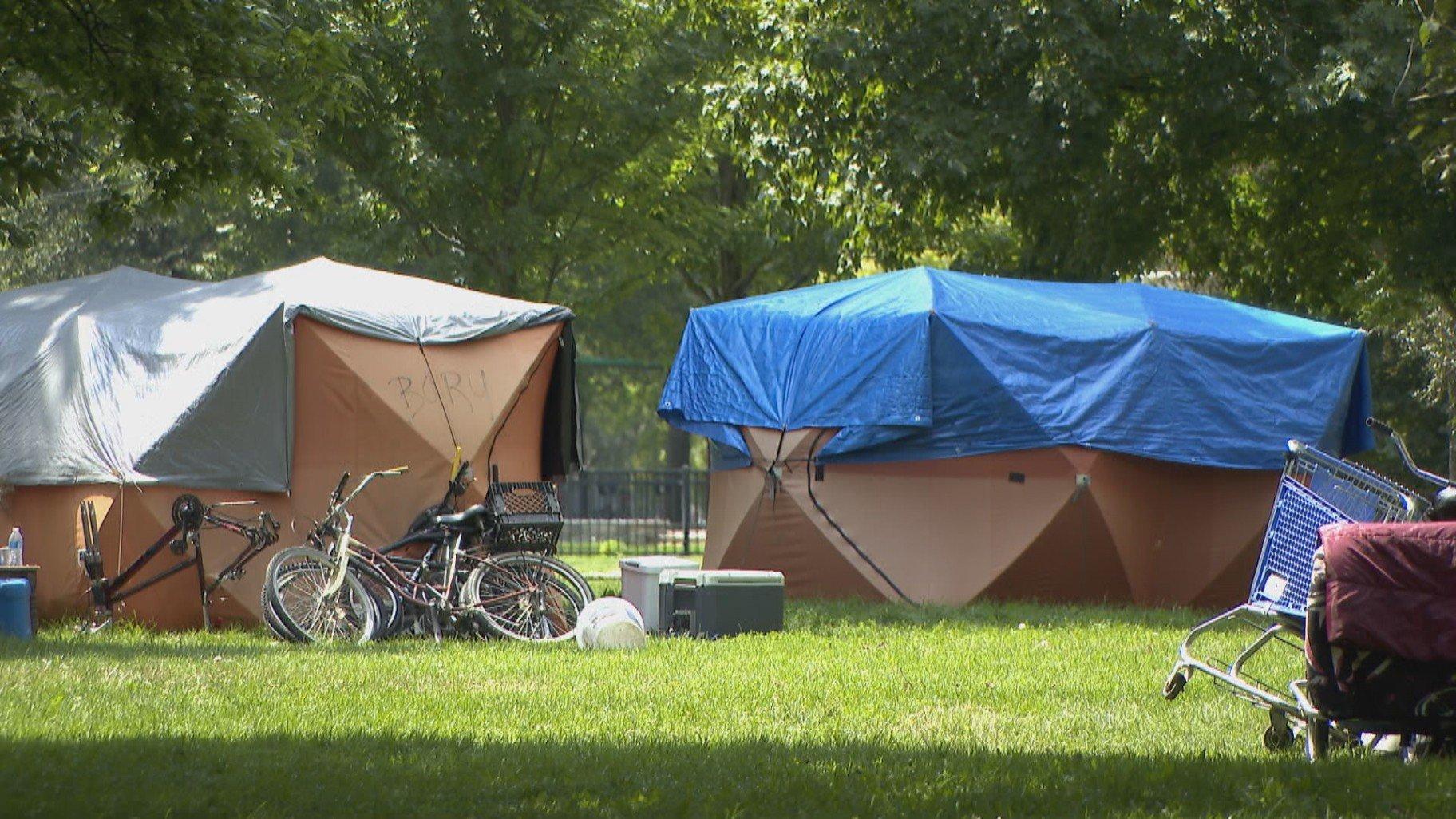 A homeless encampment in Humboldt Park. (WTTW News)
A homeless encampment in Humboldt Park. (WTTW News)
A push to hike taxes on the sales of properties worth $1 million or more to fight homelessness is gaining momentum, as the city’s watchdog endorsed its approach, and a new report found a steep increase in the number of unhoused Chicagoans.
Mayor Brandon Johnson threw his support behind a revised version of the proposal known as “Bring Chicago Home,” which will generate approximately $100 million annually. That’s enough to address the root causes of homelessness by building new permanent housing that offers wraparound services like substance abuse counseling, supporters say, in an effort to combat crime and poverty throughout Chicago.
The final proposal expected be introduced to the Chicago City Council on Sept. 13 would slash the real estate transfer tax paid by Chicagoans who sell residential and commercial properties for less than $1 million by 20%, while hiking taxes on transactions of more than $1 million by as much as 400%.
While the proposal faces an uncertain future, an audit from Inspector General Deborah Witzburg endorsed its housing-first approach to tackling homelessness, boosting its chances of passage.
Examining efforts by the city’s Department of Family and Support Services to help residents of encampments complete all of the steps necessary to secure housing and services in one day, the city’s watchdog found 94% of participants found an apartment, with nearly 79% of participants still housed five months later.
Supporters will be able to point to those findings to assuage concerns from more conservative members of the City Council that the proposal will not be effective because it does not require Chicagoans to undergo mental health counseling and substance abuse treatment before being housed in a subsidized apartment.
As the debate rages, a report released Thursday by the Chicago Coalition of the Homeless, a member of the coalition that crafted the Bring Chicago Home proposal, will increase pressure on city officials to act. The number of Chicagoans who do not have a permanent home grew 4% between 2020 and 2021 to 68,440 people, according to the report.
The coalition counts those living in Chicago shelters, on the streets and temporarily staying with others as homeless, according to the report. By contrast, federal officials only consider those who lack a “fixed, regular and adequate nighttime residence” to be homeless.
Approximately 20,000 unhoused Chicagoans are children, Johnson told WTTW News on Thursday’s “Chicago Tonight.”
“As a former public school teacher, it is very difficult to challenge a child to figure out what a comma splice is and draw conclusions and of course have some real dialogue in a classroom when they’re economically unstable,” Johnson said, calling the revised proposal a “reasonable compromise.”
State law does not give the City Council the power to change the transfer tax on its own authority. Without legislation passed by the General Assembly and signed by the governor, the measure needs the support of Chicago voters through a referendum before the City Council can levy the tax and collect the funds.
Under the current law, the buyer of a home worth $300,000 pays the same flat transfer tax as the buyer of a multimillion-dollar mansion or downtown skyscraper — a fact that supporters of the change contend is unfair. The initial proposal considered by alderpeople at a hearing in July would have hiked the transfer tax on the sale of all properties by the same amount, generating $60 million more than the revised proposal.
The seller of a home sold for $500,000 now pays $3,750 in real estate transfer taxes, a 0.75% tax rate. If voters pass the binding referendum set to be on the March 2024 primary ballot, and the City Council agrees to levy the tax, that cost would drop to $3,000, or a 0.60% tax rate, officials said.
“Protecting the interests of working people is top priority for me,” Johnson said.
Nearly 94% of all properties sold in Chicago have a final purchase price of less than $1 million, officials said.
The transfer tax on properties sold for more than $1 million would spike by 233% percent, but apply to just to the amount of the sale greater than $1 million, in an effort to ensure the measure withstands a legal challenge and reduces the incentive for sellers to artifically lower sale prices.
For example, the seller of a property that sells for $1.2 million now pays $9,000 in transfer taxes. Under the revised proposal, that would rise to $10,000, with the higher tax rate of 2% applied to just $200,000 of the sale price.
Using the same mechanism, the transfer tax on properties sold for more than $1.5 million would spike by 400% percent with the increase only applying to the amount of the sale greater than $1.5 million.
Imposing a marginal tax, rather than a flat tax, would make the tax fairer, and ease the tax burden on two- to six-unit properties, both residential and commercial, supporters said.
The revised proposal would exempt developments subsidized to be affordable, according to the proposal.
Despite the changes, the debate over whether to hike the real estate transfer tax is expected to be fierce, as leaders of business and real estate groups warn it could cause the city’s already-struggling commercial real estate market to collapse amid the shift to remote work.
However, Johnson called the proposal’s “progressive response” a “reasonable compromise” he was confident would allow Chicago’s commercial real estate market to thrive while addressing “a critical need” to help Chicago’s unhoused population.
Contact Heather Cherone: @HeatherCherone | (773) 569-1863 | [email protected]

